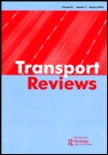
TRANSPORT REVIEWS
Scope & Guideline
Uncovering Trends that Drive Transportation Forward
Introduction
Aims and Scopes
- Interdisciplinary Transport Research:
The journal encompasses a wide range of topics within transport studies, integrating insights from engineering, social sciences, public policy, and environmental studies. - Focus on Sustainable Mobility:
There is a strong emphasis on sustainability in transport, exploring innovations and practices that promote environmentally friendly and socially equitable mobility solutions. - Impact of Technology on Transport Systems:
The journal frequently publishes research on the implications of emerging technologies, such as autonomous vehicles, smart mobility, and digital innovations, on transport networks. - Socio-Economic Dimensions of Transport:
Papers often explore the social and economic impacts of transport, including issues related to equity, accessibility, and the relationship between transport and public health. - Data-Driven Analysis and Modelling:
The use of big data, machine learning, and quantitative modelling techniques is prevalent, enabling robust analysis of travel behaviour and transport systems.
Trending and Emerging
- Health and Well-Being in Transport:
There is a growing focus on the impacts of transport on health and well-being, particularly in light of the COVID-19 pandemic, emphasizing the need for transport systems that support physical and mental health. - Equity and Justice in Transport Planning:
Research exploring transport equity and social justice issues is gaining momentum, with an emphasis on ensuring that diverse populations have fair access to transport services. - Integration of Technology and Mobility Services:
Emerging themes include the integration of technology in transport services, such as Mobility as a Service (MaaS), and how these innovations can enhance user experience and system efficiency. - Climate Change and Transport Adaptation:
Papers focusing on the adaptation of transport systems to climate change impacts, including resilience planning and sustainable practices, are increasingly prevalent. - Data-Driven Decision Making:
The use of big data analytics and machine learning techniques to inform transport policy and planning decisions is on the rise, reflecting a trend towards more evidence-based approaches.
Declining or Waning
- Traditional Transport Infrastructure Studies:
Research focusing solely on conventional transport infrastructure, such as roads and highways, has seen a decline as newer studies emphasize integrated, multimodal, and sustainable transport solutions. - Static Travel Demand Forecasting Models:
There has been a noticeable reduction in papers relying solely on traditional travel demand forecasting models, with a growing preference for dynamic, behaviorally-informed approaches that consider real-time data. - Focus on Long-Distance Travel:
Topics that exclusively address long-distance travel patterns have become less common, as recent publications prioritize urban mobility, local transport systems, and accessibility for diverse populations. - Narrowly Defined Mobility Solutions:
Papers that discuss very specific mobility solutions without a broader context, such as isolated studies on a single mode of transport, are increasingly being replaced by those that take an integrated approach. - Transport Economics in Isolation:
Research that examines transport economics without considering social and environmental impacts is declining, reflecting a shift towards more holistic analyses.
Similar Journals

Journal of Urban Mobility
Shaping the Future of Urban Transportation SolutionsThe Journal of Urban Mobility, published by ELSEVIER, is a premier open access journal dedicated to advancing the understanding of urban transportation dynamics. Since its inception in 2021, this journal has focused on addressing the complexities of mobility within urban settings, encompassing areas of geography, planning, and transportation. With an ISSN of 2667-0917, it attracts considerable attention, as evidenced by its Scopus rankings—positioned at #311 in the Geography, Planning and Development category and #77 in Transportation. The Journal aims to foster interdisciplinary dialogue, offering researchers, professionals, and students a platform for disseminating innovative studies and policy analyses that shape the future of urban mobility. Accessible through a comprehensive open access model, it ensures a wide reach and impact, making significant contributions to the field until at least 2024.
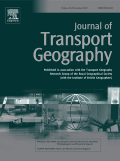
Journal of Transport Geography
Bridging Transportation and Environmental ScienceThe Journal of Transport Geography, published by Elsevier Ltd, stands as a premier international platform for the dissemination of research at the intersection of transportation and geography. Established in 1993, this journal explores critical issues in transport systems, spatial analysis, and environmental impacts, providing invaluable insights for academics, policymakers, and industry practitioners. With an impressive impact factor and ranking within the top quartiles across multiple categories including Environmental Science and Geography, Planning and Development, the journal is recognized for its rigorous peer-review process and high-quality contributions. As it converges towards the target year of 2024, the Journal of Transport Geography continues to serve as an essential resource for understanding the challenges and innovations shaping transportation landscapes globally. Access to its research is available through traditional subscription models, reinforcing its commitment to supporting the advancement of knowledge in this vital field.

Frontiers in Future Transportation
Driving Innovation in MobilityFrontiers in Future Transportation, published by FRONTIERS MEDIA SA, is an influential Open Access journal that has been at the forefront of research since its inception in 2020. With an ISSN of N/A and E-ISSN 2673-5210, this journal provides a comprehensive platform for cutting-edge studies in the field of transportation, encompassing urban studies, automotive engineering, and innovative control systems. Ranking impressively in Scopus with notable percentiles—61st in Urban Studies, 51st in Automotive Engineering, and others—it underscores its significance within the scholarly community. The journal is committed to advancing the discourse surrounding sustainable and smart transportation solutions that address the challenges of future mobility. By offering unrestricted access to research, it invites contributions from researchers, professionals, and students alike, fostering collaboration and disseminating knowledge pivotal to transforming transportation systems globally. With its headquarters based in Lausanne, Switzerland, Frontiers in Future Transportation is poised to make substantial contributions to the evolving landscape of transport research through 2024 and beyond.
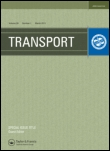
Transport
Driving the future of automotive and mechanical engineering.Transport is a leading open-access journal published by VILNIUS GEDIMINAS TECH UNIVERSITY, specializing in the fields of automotive and mechanical engineering. Since its transition to open access in 2018, the journal has become a vital platform for disseminating high-quality research and innovative practices in transport systems, engineering technologies, and sustainable mobility solutions. With an ISSN of 1648-4142 and an E-ISSN of 1648-3480, Transport is indexed in Scopus with notable rankings, including Q2 in Automotive Engineering and Q3 in Mechanical Engineering for 2023, reflecting its influential presence within these disciplines. Researchers and practitioners are encouraged to contribute to this scholarly community, where their work will reach a robust international audience, thereby advancing knowledge and fostering collaborations in the ever-evolving transport sector. Based in Lithuania, the journal is committed to maintaining rigorous peer-review standards and promoting interdisciplinary studies to address the complex challenges in transportation engineering.
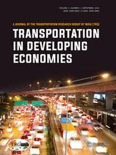
Transportation in Developing Economies
Empowering policymakers with critical insights on mobility.Transportation in Developing Economies is a premier academic journal published by SPRINGER INT PUBL AG, specializing in the interdisciplinary study of transportation systems in developing nations. With an ISSN of 2199-9287 and an E-ISSN of 2199-9295, this journal provides an essential platform for researchers, policymakers, and practitioners to explore the unique challenges and innovations in transportation infrastructure, mobility, and planning within emerging economies. The journal aims to critically assess and promote sustainable transport solutions that cater to the socio-economic dynamics of these regions, making it an invaluable resource for those invested in equitable transportation development. With its open access philosophy, it ensures widespread dissemination of research findings, fostering collaboration and knowledge exchange among scholars and industry professionals alike. As the global focus on sustainable practices intensifies, Transportation in Developing Economies stands at the forefront of vital research, contributing to both academic discourse and pragmatic advancements in the field.
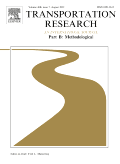
TRANSPORTATION RESEARCH PART B-METHODOLOGICAL
Advancing the frontier of transportation research methodologies.TRANSPORTATION RESEARCH PART B - METHODOLOGICAL is a premier academic journal published by Pergamon-Elsevier Science Ltd, focusing on innovative methodologies and solutions in the field of transportation research. With a prestigious Q1 ranking in key categories, including Civil and Structural Engineering, Management Science and Operations Research, and Transportation, the journal demonstrates its vital role in advancing the academic discourse and practical applications within these domains. Boasting an impressive Scopus ranking of #20 in Civil and Structural Engineering and #15 in Transportation, it attracts high-quality research that informs policy, enhances transport systems, and contributes to sustainable development. The journal serves as a critical platform for researchers, practitioners, and students alike to disseminate findings that push the boundaries of transportation science. With a publication history dating from 1979 to 2024, TRANSPORTATION RESEARCH PART B is dedicated to fostering interdisciplinary collaborations and inspiring new methodologies to tackle complex transportation challenges. As a vital resource for the academic community, it leverages a broad international perspective to enrich the field and facilitate cutting-edge research.
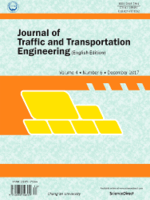
Journal of Traffic and Transportation Engineering-English Edition
Pioneering Research for the Future of Transportation.Journal of Traffic and Transportation Engineering-English Edition, published by KEAI PUBLISHING LTD, is a leading open-access journal that has been disseminating valuable research in the realms of civil and structural engineering, as well as transportation studies since 2014. With a robust impact factor reflected by its prestigious Q1 rankings in both Civil and Structural Engineering and Transportation, this journal stands at the forefront of innovation and scholarship, featuring contributions from experts across the globe. The journal is particularly noted for its practical and theoretical advancements in traffic and transportation engineering, making it indispensable for researchers, industry professionals, and students aiming to deepen their understanding of these critical fields. Dedicated to providing a platform for high-quality interdisciplinary research, the Journal of Traffic and Transportation Engineering embraces the principles of open access, ensuring that all published articles are freely available to foster knowledge sharing and collaboration within the community. With its headquarters located in Beijing, China, the journal continues to push boundaries and set new standards in the field of traffic and transportation research.
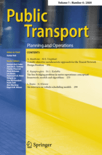
Public Transport
Driving Insights for Sustainable Urban Planning.Public Transport is a prestigious journal published by Springer Heidelberg, focusing on the critical field of transportation systems and their impacts on urban planning, infrastructure, and environmental management. With an ISSN of 1866-749X and an E-ISSN of 1613-7159, the journal has established itself as a vital resource for researchers and practitioners alike, particularly noted for its Q2 ranking in Information Systems, Management Science and Operations Research, and Transportation, alongside a Q1 ranking in Mechanical Engineering as of 2023. This blend of categories underscores its interdisciplinary nature, making it an essential reading for individuals aiming to enhance their understanding of public transport systems from various angles. While the journal currently does not offer open access, its authoritative articles are critical for driving innovation and policy in the transportation sector. With a converged publication period from 2009 to 2024, Public Transport continues to lead discussions, disseminate research trends, and provide insight into the evolution of transportation methodologies, reflecting its significant impact as a reliable academic source in this crucial field.

International Journal of Transport Economics
Pioneering Research for Global Transport ChallengesWelcome to the International Journal of Transport Economics, a premier platform published by FABRIZIO SERRA EDITORE that explores the intricate relationship between transport economics and its impact on societal progress. Established to foster academic discourse, this journal serves as a vital resource for researchers, professionals, and students in the fields of economics, transportation, and public policy. With a commitment to publishing high-quality, peer-reviewed articles, the journal delves into essential topics such as transport policy analysis, infrastructure economics, and sustainable transportation solutions. Although it operates under a traditional subscription model, the journal remains dedicated to disseminating crucial findings that influence transport strategies worldwide. Nestled in the heart of Pisa, Italy, the International Journal of Transport Economics stands as a beacon of knowledge, playing a pivotal role in shaping the future of transport economics and promoting innovative research in the discipline.

Revista de Transporte y Territorio
Advancing Sustainable Solutions for Urban MobilityRevista de Transporte y Territorio is a prominent academic journal published by the University of Buenos Aires, Institute of Geography, dedicated to the study of transportation systems and territorial dynamics. With its ISSN 1852-7175, this journal serves as a crucial platform for disseminating cutting-edge research and innovative practices in the fields of geography, urban planning, and transportation studies. Aimed at researchers, professionals, and students alike, the journal seeks to foster dialogue and understanding of the interrelationships between transportation and territorial development, providing insights into sustainable solutions for contemporary mobility challenges. Although currently not designated as Open Access, the journal is committed to high academic standards, ensuring that all published works undergo rigorous peer review. Situated in Buenos Aires, Argentina, the Revista de Transporte y Territorio not only highlights regional issues but also contributes to the global discourse on transportation and territory.